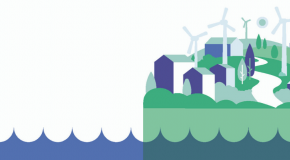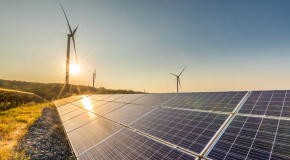Podcast | How to invest in artificial intelligence in Asia-Pacific?
Related content

Podcast | Can China's economic slowdown create opportunities in Asia?
This is the second episode in the "Shelter from the storm" series on economic, geopolitical and environmental challenges facing companies and markets today. In this episode, we look at the dominant role of China in Asia's economy and the effect its slowdown might have on the region.
Our guests are:
Raymond Cheng, managing director and chief investment officer for North Asia at Standard Chartered Bank in Hong Kong Martin Hennecke, head of Asia investment advisory at St. James Place Wealth ManagementShelter from the storm: Investing in the era of uncertainty is a five-part podcast series, supported by EquitiesFirst.
The episode is hosted by Piotr Zembrowski, CFA, Senior Manager, Policy and Insights at Economist Impact.
*/The podcast has been prepared for informational purposes only. This episode is not an offering of a financial product or investment advice. It is not intended for residents in any jurisdiction where its use is not authorised or is unlawful.
Follow on Apple podcasts | Spotify | Google podcasts | Your preferred podcasting platforms

Podcast | Shelter from the storm: Investing in the era of uncertainty
In the first episode in the "Shelter from the storm" series on economic, geopolitical and environmental challenges facing companies and markets today, our guests discuss the realignment of global supply chains and its effect on the economies and industries in Asia Pacific. They talk about ways in which investors can safeguard their portfolios and where they can find opportunities amid the turmoil.
The guests are:
Noli de Pala, CFA, Chief Investment Officer and Executive Director at TriLake Partners, Singapore Gareth Nicholson, Chief Investment Officer and Head of Discretionary Portfolio Management at Nomura International Wealth Management, Singapore.Shelter from the storm: Investing in the era of uncertainty is a five-episode series, sponsored by EquitiesFirst.
*/
The podcast has been prepared for informational purposes only. This episode is not an offering of a financial product or investment advice. It is not intended for residents in any jurisdiction where its use is not authorised or is unlawful.
Follow on Apple podcasts | Spotify | Google podcasts | Your preferred podcasting platforms

The shifting landscape of global wealth: Future-proofing prosperity in a ti...
In some instances the impact of this shift will be shaped by local factors, such as demographic changes. In other instances this shift will reflect shared characteristics, as demonstrated by the greater popularity of overseas investing among younger high-net-worth individuals (HNWIs) brought up in an era of globalisation. Whatever the drivers, the landscape of wealth is changing—from local to global, and from one focused on returns to one founded on personal values.
Despite rising economic concerns and a tradition of investor home bias in large parts of the world, the new landscape of wealth appears less interested in borders. According to a survey commissioned by RBC Wealth Management and conducted by The Economist Intelligence Unit (EIU), younger HNWIs are substantially more enthusiastic about foreign investing. The U.S. is a particularly high-profile example of a country where a long-standing preference for investments in local markets appears set to be transformed.
Click the thumbnail below to download the global executive summary.
Read additional articles from The EIU with detail on the shifting landscape of global wealth in Asia, Canada, the U.S. and UK on RBC's website.
Podcast | How to weather the coming recession
Related content

The shifting landscape of global wealth: Future-proofing prosperity in a ti...
In some instances the impact of this shift will be shaped by local factors, such as demographic changes. In other instances this shift will reflect shared characteristics, as demonstrated by the greater popularity of overseas investing among younger high-net-worth individuals (HNWIs) brought up in an era of globalisation. Whatever the drivers, the landscape of wealth is changing—from local to global, and from one focused on returns to one founded on personal values.
Despite rising economic concerns and a tradition of investor home bias in large parts of the world, the new landscape of wealth appears less interested in borders. According to a survey commissioned by RBC Wealth Management and conducted by The Economist Intelligence Unit (EIU), younger HNWIs are substantially more enthusiastic about foreign investing. The U.S. is a particularly high-profile example of a country where a long-standing preference for investments in local markets appears set to be transformed.
Click the thumbnail below to download the global executive summary.
Read additional articles from The EIU with detail on the shifting landscape of global wealth in Asia, Canada, the U.S. and UK on RBC's website.

Fintech in ASEAN
To better understand the opportunities and challenges in developing a fintech business in seven ASEAN markets, The Economist Intelligence Unit conducted wide-ranging desk research supplemented by seven in-depth interviews with executives in Australia and ASEAN.
Download report and watch video interview to learn more.

Risks and opportunities in a changing world
Read our Taxing digital services, U.S. tax reform: The global dimension, & Planning for life after NAFTA articles by clicking the thumbnails below.
Podcast | Shelter from the storm: Investing in the era of uncertainty
Related content

The shifting landscape of global wealth: Future-proofing prosperity in a ti...
In some instances the impact of this shift will be shaped by local factors, such as demographic changes. In other instances this shift will reflect shared characteristics, as demonstrated by the greater popularity of overseas investing among younger high-net-worth individuals (HNWIs) brought up in an era of globalisation. Whatever the drivers, the landscape of wealth is changing—from local to global, and from one focused on returns to one founded on personal values.
Despite rising economic concerns and a tradition of investor home bias in large parts of the world, the new landscape of wealth appears less interested in borders. According to a survey commissioned by RBC Wealth Management and conducted by The Economist Intelligence Unit (EIU), younger HNWIs are substantially more enthusiastic about foreign investing. The U.S. is a particularly high-profile example of a country where a long-standing preference for investments in local markets appears set to be transformed.
Click the thumbnail below to download the global executive summary.
Read additional articles from The EIU with detail on the shifting landscape of global wealth in Asia, Canada, the U.S. and UK on RBC's website.

Fintech in ASEAN
To better understand the opportunities and challenges in developing a fintech business in seven ASEAN markets, The Economist Intelligence Unit conducted wide-ranging desk research supplemented by seven in-depth interviews with executives in Australia and ASEAN.
Download report and watch video interview to learn more.

Risks and opportunities in a changing world
Read our Taxing digital services, U.S. tax reform: The global dimension, & Planning for life after NAFTA articles by clicking the thumbnails below.
Materiality of Asia: Investing away from climate risk
What constitutes material climate risks remains under debate within the financial industry, with clarity and consensus on the topic elusive. It is clear, however, that unless parties agree on what needs to be measured, the consequence could be an irreversible breach of climate limits—such as those set out in the Paris Agreement.
Related content

The shifting landscape of global wealth: Future-proofing prosperity in a ti...
In some instances the impact of this shift will be shaped by local factors, such as demographic changes. In other instances this shift will reflect shared characteristics, as demonstrated by the greater popularity of overseas investing among younger high-net-worth individuals (HNWIs) brought up in an era of globalisation. Whatever the drivers, the landscape of wealth is changing—from local to global, and from one focused on returns to one founded on personal values.
Despite rising economic concerns and a tradition of investor home bias in large parts of the world, the new landscape of wealth appears less interested in borders. According to a survey commissioned by RBC Wealth Management and conducted by The Economist Intelligence Unit (EIU), younger HNWIs are substantially more enthusiastic about foreign investing. The U.S. is a particularly high-profile example of a country where a long-standing preference for investments in local markets appears set to be transformed.
Click the thumbnail below to download the global executive summary.
Read additional articles from The EIU with detail on the shifting landscape of global wealth in Asia, Canada, the U.S. and UK on RBC's website.

Fintech in ASEAN
To better understand the opportunities and challenges in developing a fintech business in seven ASEAN markets, The Economist Intelligence Unit conducted wide-ranging desk research supplemented by seven in-depth interviews with executives in Australia and ASEAN.
Download report and watch video interview to learn more.

Risks and opportunities in a changing world
Read our Taxing digital services, U.S. tax reform: The global dimension, & Planning for life after NAFTA articles by clicking the thumbnails below.
Podcast | Investing and reinvention: tech’s role in rolling back climate change
Related content

Tech imperative: Looking beyond ESG investing to reinvent the future
Tech imperative: Looking beyond ESG to reinvent the future is a report from The Economist Intelligence Unit, commissioned by E Fund.
In the world of finance, green bonds were introduced to encourage sustainable projects. Environmental, social and governance (ESG) factors have spurred investors to review where their dollars go to ensure they do more good than harm. And impact investing has ratcheted that objective up to fund projects, programmes and organisations that have missions tightly aligned with the Sustainable Development Goals. But what about a more old-fashioned approach of favouring the better mouse trap? Not necessarily the box-ticking exercise of ESG or the policy acrobatics of green bonds, but simply investing in technologies that show promise to decarbonise the environment.
This report, surveying more than 300 large investment funds—including asset managers and asset owners—investigates how these organisations view investment into technologies that mitigate and adapt to climate change, as well as areas they are investing in, and whether the return objectives are framed differently to other investments.
In addition, this study takes wide-ranging desk research and indepth interviews with experts in the fields of investing, climate and technology into account. Dewi John is the report author and Jason Wincuinas is the editor. Our thanks are due to the following interviewees for their time and insights:
Mark Campanale, founder and executive chairman, Carbon Tracker Initiative Stephen Freedman, head of research and sustainability, thematic equities, Pictet Asset Management Andrew Gray, director of ESG and stewardship, AustralianSuper Pedro Antonio Guazo Alonso, representative of the secretary-general for investments, UN Joint Staff Pension Fund (UNJSPF) Carine Smith Ihenacho, chief corporate governance officer, Norges Bank Investment Management (NBIM) Adrian Locher, founder and CEO, Merantix Julian Poulter, partner, Energy Transition Advisors Anne Simpson, director, board governance and strategy, CalPERS
Podcast | The World In 2021: Asia edition
In the final episode of 2020, host Jason Wincuinas speaks to Tom Standage, deputy editor at The Economist, and editor of The World In 2021, a collection of forward-gazing coverage from The Economist, to find out what the world in 2021 will look like in Asia.
Relevant content from The Economist:
The World In 2021 Ten trends to watch in the coming year by Tom Standage The World Ahead The World Ahead from The Economist RadioTopics covered:
Will 2021 be the year of the vaccine? What will recovery look like? The "new world disorder" - will it get better? Revival of the WTO Will China pick up the global baton after the US? Will companies step up on social issues? The rise of tech companies in Asia Where will the first flying car be?Listen to the previous episodes and subscribe for upcoming episodes.
Subscribe on iTunes | Spotify | Google podcasts | Your preferred podcasting platforms
Relevant content from The Economist Intelligence Unit:
China icebergs (case study on autonomous vehicles in China) Intertwined relations: China, the US, and the global trade of AI
Podcast | Intertwined relations: China, the US, and the global trade of AI
In this episode, senior editor Jason Wincuinas speaks to Jeffrey Ding, a Rhodes Scholar at the University of Oxford and the China lead at “The Centre for the Governance of AI”, which is part of the Future of Humanity Institute, and founder of "ChinAI" (chinai.substack.com), a newsletter that shares translations of Chinese AI research papers.
Subscribe on iTunes | Spotify | Google podcasts | Your preferred podcasting platforms
Tech imperative: Looking beyond ESG investing to reinvent the future
Tech imperative: Looking beyond ESG to reinvent the future is a report from The Economist Intelligence Unit, commissioned by E Fund.
Related content

Green intelligence: Asia’s ESG investing, data integrity and technology
Environmental, social and governance (ESG) investing has evolved from the rather straightforward approach of stock exclusion to more sophisticated and data-heavy frameworks. How investment firms are tackling this ESG data load is a key question. This research analyses the degree to which artificial intelligence (AI) is being deployed, how it is being used and what more it might do in the future for ESG investment decisions. Integral to that question is an investigation into the state, availability and integrity of ESG data in Asia. Big data has offered insight in many other business sectors and industries, but is Asia’s ESG data big enough yet to be meaningful?
The Economist Intelligence Unit surveyed decision-makers at a spectrum of large asset owners and institutional investors about their observations related to “impact” versus “income” goals and about sentiment on data quality. We also spoke to a range of experts on the same topics to study how AI technology may be changing the investment world, specifically with regard to improving ESG returns or impact.
The key findings are as follow:
The rise of ESG in Asia: some 95% of respondents believe that ESG investing is important to their firm, with the overwhelming majority saying it will be more so in three years. More than 80% believe ESG has a positive impact on returns.ESG factor weighting: almost half of respondents said they weighted environmental, social and governance factors equally. For the remainder that didn’t, the individual most important factor was environmental, with mainland China’s increasing focus on such issues a major driver. About 90% of respondents feel that environmental and social issues will gain the same importance as governance within a decade.
Investors’ AI uptake: pension funds have the highest uptake of AI for ESG screening. There is, however, broad usage across all investor types and regions. A rapidly expanding range of AI techniques, drawing information from diverse sources, is being used to fill gaps in standard corporate disclosures.
Data quality and suitability: while there is broad satisfaction with available data, this is combined with recognition that gaps exist. Most investors are responding to such limitations by conducting their own research on the information available.
Looking forward: much ESG-related data are backwards-facing and cannot, therefore, identify ongoing change in corporate behaviour. The promise of adding AI to the equation is to get a more forward view. Analytics companies are developing models to flag behavioural shifts and experts stress that focusing on data only misses the importance of how it is framed—something that remains a very human decision.

Sustainable and actionable: An ESG study of climate and social challenge fo...
Along with its wealth, Asia’s climate risks have been rising. Low-lying coastal cities are particularly vulnerable to climate change and regional population and economic centres—such as Bangkok, Ho Chi Minh City, Manila and Shanghai—sit upon that precipice. Yet in terms of green fixed income, Asia faces another risk: lack of issuance and uptake.
Fixed-income plays a significant role in climate mitigation because its market is about 60% larger than its equity cousin which still attracts more media and investor attention. Global issuance of green fixed income has increased markedly since its inception, reaching US$350bn in 2019. Still, the amount is only about 5% of the global fixed income market and represents just over a tenth of what needs to be raised to meet Sustainable Development Goals (SDGs) in emerging markets alone.
Efforts to make Asia’s finance greener have marked a transformative effect on the relationship between companies and investors. Conversations about sustainability that were absent a decade ago are now happening and have been central to helping the region come so far in such a short time: Asia’s banks and corporates have gone from 1% of green issuance in 2013 to 45% in 2019.
Still, not all is rosy (or green) as many obstacles remain. Asia’s green fixed income originates from a narrow base. China is the dominant market regionally and credit quality is largely confined to supranational institutions and investment-grade issuers. That is not enough. Other markets, such as high-yield, assetbacked securities (ABS) and private debt are, at best, in infancy. Furthermore, developedmarket investors tend to underweight Asia.
Green fixed income data is also a persistent challenge. A profusion of providers use a wide range of methodologies, many of which can be opaque and defy comparison. Investors face difficulties in determining those which best suit their needs. The vast amount of data that issuers are required to provide can also be a deterrent to going green; or worse, it leads to “greenwashing”, a vexing problem of questionable categorisation globally. The emergence of more consistent taxonomies is helping, but the patchwork of approaches still forms a barrier. Market practitioners interviewed for this paper did find agreement on green fixed income limitations, but they also showed optimism that recent developments in debt-products indicate a positive direction, even if the needle measuring progress has yet to move as far as it should.
From consensus, the region’s green fixed income progress depends on the development of a consistent taxonomy—not just in Asia, but globally—as well as better linkage of Paris Agreement goals to quantifiable key performance indicators (KPIs). The result could create better incentives for issuers and asset owners alike.
Have green bonds—as the largest green fixed income competent—been enough? Despite the interviewees’ breadth of experience and varied professional functions, they are almost entirely synchronised in their response to this question: “no”.
So what’s next?

Financing sustainability: Asia Pacific embraces the ESG challenge
Financing sustainability: Asia Pacific embraces the ESG challenge is an Economist Intelligence Unit report, sponsored by Westpac. It explores the drivers of sustainable finance growth in Asia Pacific as well as the factors constraining it. The analysis is based on two parallel surveys—one of investors and one of issuers—conducted in September and October 2019.
If the countries of Asia Pacific are to limit the negative environmental effects of continued economic growth, and companies in the region are to mitigate their potential climate risks and make a positive business contribution through improving the environment and meeting the UN's Sustainable Development Goals (SDGs), large volumes of investment in sustainable projects and businesses need to be mobilised. A viable sustainable finance market is taking shape in the region to channel commercial investor funds, and both investors and issuers say they are achieving a financial benefit from their investment and financing activities. The market is still in the early stages of development, however, and must expand and mature to meet investor needs.
The chief constraint on sustainable finance growth in the region has been the limited supply of bankable sustainable projects. Our research suggests supply is increasing, but with investor demand continuing to grow apace, the gap will remain an obstacle in the short- to medium-term. Among the organisations in our issuer survey, only 7% have used sustainable finance instruments to fund projects. However, nearly nine in ten (87%) said they intend to do so in the next year, which should begin to bridge the gap between supply and demand.
Based on issuers’ stated intentions, investors will have a range of instruments to choose from, including green loans and bonds and sustainability loans and bonds. Large numbers of investors indicate that they intend to deploy a greater proportion of capital to these over the next three years.
The Hinrich Foundation Sustainable Trade Index 2020 - Workbook
International trade has helped to lift hundreds of millions of people around the world out of poverty, but the benefits do not come without risk. Right or wrong, labour disruption, environmental degradation, and worsening inequality are frequently associated with trade. However, proactive and responsible policy can harness the good elements of trade while mitigating the bad, making for a more robust global trading community.
Related content

The Hinrich Foundation Sustainable Trade Index 2018
Yet the enthusiasm in Asia for trade does not appear to have waned. This broad societal consensus behind international trade has enabled Asian countries to continue broadening and deepening existing trading relationships, for example, by quickly hammering out a deal for the Comprehensive and Progressive Agreement for Trans-Pacific Partnership (CPTPP) in early 2018 following the US’s withdrawal from its predecessor in 2017.
Asia, then, finds itself in the unique position of helping lead and sustain the global economy’s commitment to free and fair trade. It is in this context that the need for sustainability in trade is ever more crucial.
The Hinrich Foundation Sustainable Trade Index was created for the purpose of stimulating meaningful discussion of the full range of considerations that policymakers, business executives, and civil society leaders must take into account when managing and advancing international trade.
The index was commissioned by the Hinrich Foundation, a non-profit organisation focused on promoting sustainable trade. This, the second edition of the study, seeks to measure the capacity of 20 economies—19 in Asia along with the US—to participate in the international trading system in a manner that supports the long-term domestic and global goals of economic growth, environmental protection, and strengthened social capital. The index’s key findings include:
Countries in Asia, especially the richer ones, have broadly regressed in terms of trade sustainability. Hong Kong is developed Asia’s bright spot, recording a slight increase in its score and topping the 2018 index. Several middle-income countries perform admirably, led by Sri Lanka. For the economic pillar, countries generally performed well in terms of growing their labour forces as well as their per-head GDPs. For the social pillar, sharp drops for some countries in certain social pillar indicators contribute to an overall decline. For the environmental pillar, with deteriorating environmental sustainability in many rich countries, China, Laos and Pakistan are the only countries to record increases in scores. Sustainability is an ever more important determinant of FDI and vendor selection in choosing supply-chain partners. Companies are improving the sustainability of their supply chains by restructuring and broadening relationships with competitors and vendors.
Hinrich Foundation Sustainable Trade Index-Infographic
The Hinrich Foundation Sustainable Trade Index 2020
Sustainability was gaining more traction in the years leading up to the Covid-19 pandemic. Firms stepped up commitments to corporate social responsibility (CSR) initiatives. Investors started incorporating environmental, social and governance (ESG) issues into their asset allocation decisions. And consumers voted with their wallets to support sustainable production, purchasing goods with certified claims regarding their environmental impact and use of labour.
Related content

Hinrich Foundation Sustainable Trade Index
International trade has become fundamental to economic growth and in doing so, has helped to lift hundreds of millions out of poverty. But it is not without costs and risks. The flow of goods and services across borders can disrupt labour markets, accelerate environmental degradation, and contribute to worsening inequality. With the right policies, these costs can be reduced, if not eliminated, and trade can become more sustainable.
The Hinrich Foundation Sustainable Trade Index was created for the purpose of stimulating meaningful discussion of the full range of considerations that policy makers, business executives, and civil society leaders must take into account when managing and advancing international trade. As a starting point, we define “trade sustainability”, or “sustainable trade,” as:
“Participating in the international trading system in a manner thatsupportsthe long-term domestic and global goals of economic growth, environmental protection, and strengthening social capital.
Read report in: English | 中文 | Tiếng ViệtView infographic in: English | 中文 | Tiếng Việt

The Hinrich Foundation Sustainable Trade Index 2018
Yet the enthusiasm in Asia for trade does not appear to have waned. This broad societal consensus behind international trade has enabled Asian countries to continue broadening and deepening existing trading relationships, for example, by quickly hammering out a deal for the Comprehensive and Progressive Agreement for Trans-Pacific Partnership (CPTPP) in early 2018 following the US’s withdrawal from its predecessor in 2017.
Asia, then, finds itself in the unique position of helping lead and sustain the global economy’s commitment to free and fair trade. It is in this context that the need for sustainability in trade is ever more crucial.
The Hinrich Foundation Sustainable Trade Index was created for the purpose of stimulating meaningful discussion of the full range of considerations that policymakers, business executives, and civil society leaders must take into account when managing and advancing international trade.
The index was commissioned by the Hinrich Foundation, a non-profit organisation focused on promoting sustainable trade. This, the second edition of the study, seeks to measure the capacity of 20 economies—19 in Asia along with the US—to participate in the international trading system in a manner that supports the long-term domestic and global goals of economic growth, environmental protection, and strengthened social capital. The index’s key findings include:
Countries in Asia, especially the richer ones, have broadly regressed in terms of trade sustainability. Hong Kong is developed Asia’s bright spot, recording a slight increase in its score and topping the 2018 index. Several middle-income countries perform admirably, led by Sri Lanka. For the economic pillar, countries generally performed well in terms of growing their labour forces as well as their per-head GDPs. For the social pillar, sharp drops for some countries in certain social pillar indicators contribute to an overall decline. For the environmental pillar, with deteriorating environmental sustainability in many rich countries, China, Laos and Pakistan are the only countries to record increases in scores. Sustainability is an ever more important determinant of FDI and vendor selection in choosing supply-chain partners. Companies are improving the sustainability of their supply chains by restructuring and broadening relationships with competitors and vendors.
Hinrich Foundation Sustainable Trade Index-Infographic
Below zero: How low rates are reshaping the investment landscape
Touted as a central bank emergency response tool, negative interest rates across much of the developed world are becoming an entrenched norm. Even before the coronavirus pandemic paralysed economies and sent markets into a tailspin, interest rates in Japan and much of Europe were below zero and negative yields had enveloped a quarter of the global bond market.
Since March 2020, central bank rates have been negative in either nominal or real terms across the Group of Seven leading economies: Canada, France, Germany, Italy, Japan, the UK and the US.
Related content

Financing sustainability: Asia Pacific embraces the ESG challenge
Financing sustainability: Asia Pacific embraces the ESG challenge is an Economist Intelligence Unit report, sponsored by Westpac. It explores the drivers of sustainable finance growth in Asia Pacific as well as the factors constraining it. The analysis is based on two parallel surveys—one of investors and one of issuers—conducted in September and October 2019.
If the countries of Asia Pacific are to limit the negative environmental effects of continued economic growth, and companies in the region are to mitigate their potential climate risks and make a positive business contribution through improving the environment and meeting the UN's Sustainable Development Goals (SDGs), large volumes of investment in sustainable projects and businesses need to be mobilised. A viable sustainable finance market is taking shape in the region to channel commercial investor funds, and both investors and issuers say they are achieving a financial benefit from their investment and financing activities. The market is still in the early stages of development, however, and must expand and mature to meet investor needs.
The chief constraint on sustainable finance growth in the region has been the limited supply of bankable sustainable projects. Our research suggests supply is increasing, but with investor demand continuing to grow apace, the gap will remain an obstacle in the short- to medium-term. Among the organisations in our issuer survey, only 7% have used sustainable finance instruments to fund projects. However, nearly nine in ten (87%) said they intend to do so in the next year, which should begin to bridge the gap between supply and demand.
Based on issuers’ stated intentions, investors will have a range of instruments to choose from, including green loans and bonds and sustainability loans and bonds. Large numbers of investors indicate that they intend to deploy a greater proportion of capital to these over the next three years.

Green intelligence: Asia’s ESG investing, data integrity and technology
Environmental, social and governance (ESG) investing has evolved from the rather straightforward approach of stock exclusion to more sophisticated and data-heavy frameworks. How investment firms are tackling this ESG data load is a key question. This research analyses the degree to which artificial intelligence (AI) is being deployed, how it is being used and what more it might do in the future for ESG investment decisions. Integral to that question is an investigation into the state, availability and integrity of ESG data in Asia. Big data has offered insight in many other business sectors and industries, but is Asia’s ESG data big enough yet to be meaningful?
The Economist Intelligence Unit surveyed decision-makers at a spectrum of large asset owners and institutional investors about their observations related to “impact” versus “income” goals and about sentiment on data quality. We also spoke to a range of experts on the same topics to study how AI technology may be changing the investment world, specifically with regard to improving ESG returns or impact.
The key findings are as follow:
The rise of ESG in Asia: some 95% of respondents believe that ESG investing is important to their firm, with the overwhelming majority saying it will be more so in three years. More than 80% believe ESG has a positive impact on returns.ESG factor weighting: almost half of respondents said they weighted environmental, social and governance factors equally. For the remainder that didn’t, the individual most important factor was environmental, with mainland China’s increasing focus on such issues a major driver. About 90% of respondents feel that environmental and social issues will gain the same importance as governance within a decade.
Investors’ AI uptake: pension funds have the highest uptake of AI for ESG screening. There is, however, broad usage across all investor types and regions. A rapidly expanding range of AI techniques, drawing information from diverse sources, is being used to fill gaps in standard corporate disclosures.
Data quality and suitability: while there is broad satisfaction with available data, this is combined with recognition that gaps exist. Most investors are responding to such limitations by conducting their own research on the information available.
Looking forward: much ESG-related data are backwards-facing and cannot, therefore, identify ongoing change in corporate behaviour. The promise of adding AI to the equation is to get a more forward view. Analytics companies are developing models to flag behavioural shifts and experts stress that focusing on data only misses the importance of how it is framed—something that remains a very human decision.

Podcast | RMB to CBDC: Implications of China's digital currency
China is developing an all-digital currency. Could it completely replace the paper RMB? Could it compete with the dollar for global interoperability and dominance? The EIU speaks with Andrew Work, co-founder of The Lion Rock Institute, about his recent report on a digital Yuan and how a Central Bank Digital Currency (CBDC) even works—including features, bugs, and implications for global businesses.
This episode is hosted by Jason Wincuinas, senior editor, Asia, at The Economist Intelligence Unit.
Subscribe on iTunes | Spotify | Google podcasts | Your preferred podcasting platforms
Podcast | What would a protracted war in Ukraine mean for Asia-Pacific economies?
Related content

Podcast | Shelter from the storm: Investing in the era of uncertainty
In the first episode in the "Shelter from the storm" series on economic, geopolitical and environmental challenges facing companies and markets today, our guests discuss the realignment of global supply chains and its effect on the economies and industries in Asia Pacific. They talk about ways in which investors can safeguard their portfolios and where they can find opportunities amid the turmoil.
The guests are:
Noli de Pala, CFA, Chief Investment Officer and Executive Director at TriLake Partners, Singapore Gareth Nicholson, Chief Investment Officer and Head of Discretionary Portfolio Management at Nomura International Wealth Management, Singapore.Shelter from the storm: Investing in the era of uncertainty is a five-episode series, sponsored by EquitiesFirst.
*/
The podcast has been prepared for informational purposes only. This episode is not an offering of a financial product or investment advice. It is not intended for residents in any jurisdiction where its use is not authorised or is unlawful.
Follow on Apple podcasts | Spotify | Google podcasts | Your preferred podcasting platforms

The shifting landscape of global wealth: Future-proofing prosperity in a ti...
In some instances the impact of this shift will be shaped by local factors, such as demographic changes. In other instances this shift will reflect shared characteristics, as demonstrated by the greater popularity of overseas investing among younger high-net-worth individuals (HNWIs) brought up in an era of globalisation. Whatever the drivers, the landscape of wealth is changing—from local to global, and from one focused on returns to one founded on personal values.
Despite rising economic concerns and a tradition of investor home bias in large parts of the world, the new landscape of wealth appears less interested in borders. According to a survey commissioned by RBC Wealth Management and conducted by The Economist Intelligence Unit (EIU), younger HNWIs are substantially more enthusiastic about foreign investing. The U.S. is a particularly high-profile example of a country where a long-standing preference for investments in local markets appears set to be transformed.
Click the thumbnail below to download the global executive summary.
Read additional articles from The EIU with detail on the shifting landscape of global wealth in Asia, Canada, the U.S. and UK on RBC's website.

Fintech in ASEAN
To better understand the opportunities and challenges in developing a fintech business in seven ASEAN markets, The Economist Intelligence Unit conducted wide-ranging desk research supplemented by seven in-depth interviews with executives in Australia and ASEAN.
Download report and watch video interview to learn more.


